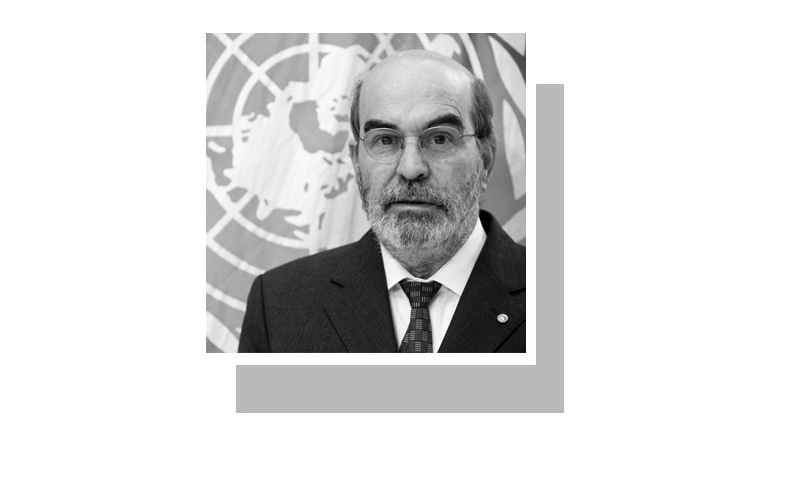
JUST some days ago, on Sept 22, the Food and Agriculture Organisation (FAO) of the UN co-organised along with the International Fund for Agricultural Development and the World Food Programme, the Pathways to Zero Hunger event, which took place on the sidelines of the 71st UN General Assembly session in New York.
The international community, including many influential leaders, had the opportunity not only to reinforce their commitments to achieve zero hunger but also to exchange information, experiences and ideas on the progress already made and the best way forward.
Since its launch in 2012, one of the main contributions of the Zero Hunger Challenge has been raising awareness of the importance of adopting a holistic approach to eradicating not only hunger but also all other forms of malnutrition.
In fact, there was a time when providing food security, addressing nutrition, improving rural livelihoods and promoting sustainable agriculture were viewed as separate tasks, as the responsibility of different actors, and with different purposes.
In Pakistan, 22pc of people are food-insecure.
The Zero Hunger movement has helped the international community to understand that we will not achieve these objectives unless we recognise that they are interdependent, and unless we decide to tackle them together.
The 2030 Agenda for Sustainable Development goes further and takes the concept of interconnectivity to other areas, based on the three dimensions of sustainability: economic, social and environmental.
In fact, achieving zero hunger is also linked to ending extreme poverty, addressing climate change, fighting inequality, building resilience as well as many other aspects.
Over the past years, I had the honour to meet the Minister for National Food Security and Research, Mr Sikandar Hayat Khan Bosan, on several occasions during which we discussed ways to continue boosting the National Zero Hunger Programme launched in 2012.
Minister Bosan had visited Brazil in 2014, and he was impressed with the results achieved by the Brazilian Zero Hunger Programme, particularly the link between school meals and the acquisition of food produced by family farmers.
The Zero Hunger strategy, one of the cornerstones of Luiz Inácio ‘Lula’ da Silva’s presidency, brought together a set of programmes that acted on four pillars: facilitating access to adequate food, agriculture support especially for family farmers, income-generating activities and social protection.
This model can also work well for Pakistan. With strong commitments and political will, achieving zero hunger in Pakistan is possible.
For this, the country needs strong political will and an integrated national strategy. It is also important to work close to the beneficiaries, with oversight provided by the communities and civil society. Recent figures estimate that some 30 per cent of the population in Pakistan lives below the poverty line, while 22pc is considered food-insecure.
Population growth is a continuing issue in Pakistan with the current estimate being around 190 million people. As the population continues to increase, concern is mounting on the ability to increase agricultural production in a sustainable way. Agriculture has been challenged by less predictable and more erratic weather swings which are now attributed to the changing climate. Agriculture itself needs to adapt to the impacts of climate change.
FAO has a long history in Pakistan as this country joined it only three weeks after gaining independence in 1947. It is working with the government and communities across the country to support agriculture and food security policy formulation and implementation.
Activities include animal health (foot-and-mouth disease and sheep and goat plague control), marine fisheries assessment for management planning, aquaculture development, irrigation development, small farmer agriculture improvement, climate-smart agriculture farmer field schools, kitchen gardens and women empowerment, amongst others. FAO is also working closely with Fata secretariat to support the resumption of agriculture-based livelihoods for the many thousands of formerly displaced farmers returning to the tribal region.
How to ensure that there are no hungry people in Pakistan is a question to which we must find an answer — and the clock is ticking toward 2030, the year world leaders agreed would be the deadline to reach zero hunger and 16 other sustainable development goals.
Countries acting alone cannot resolve all of the challenges of today. Strong collaboration with other nations, international organisations, NGOs, civil society and the private sector will be key to finding sustainable solutions. And the focus needs to be on the youth of today; with their inquiring minds and access to new technologies and innovations, they will help to lead us to the final goal where we can rightly call ourselves the ‘zero hunger generation’.
This is the right moment to work harder than ever towards these objectives. FAO is committed to supporting efforts which will ultimately lead to a more productive and sustainable future for Pakistan and its people. The time to act is now.
The writer is director general, Food & Agriculture Organisation of the UN based in Rome.
Published in Dawn, October 9th, 2016









































